For the international readers: The Tesla Model S comes with a Universal Mobile Connector which allows you to plug into any outlet. That’s useful for situations where you really, really, really need a charge, but I don’t think it’s a good and safe idea to use it for your every day charging.
This post is focused on the Dutch and Belgian readers so I’ll continue this post in Dutch.
Bij de Model S wordt een Universal Mobile Connector (UMC) geleverd waarmee je de Model S thuis kan opladen aan een Rode CEE 3-fase 16A.
Ik vind dit geen verstandige keuze van Tesla vanwege meerdere redenen die ik hier onder uiteen zal zetten.
De Rode 16A CEE
Deze komen we ongemerkt in ons dagelijks leven vaak tegen. Ze worden voor veel toepassingen gebruikt, maar ze zijn vooral te vinden bij bedrijven.
Ze zien er als volgt uit:
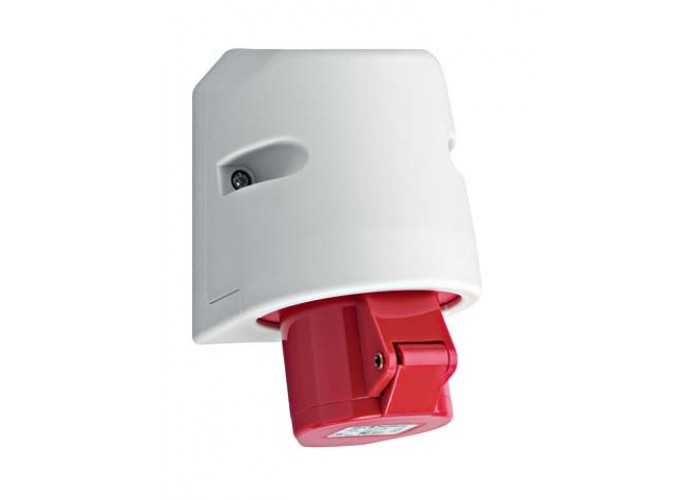
Een dergelijke aansluiting levert maximaal 16A bij 3-fase 400V. Ze bestaan ook in een 32A versie, echter kan een Model S daar niet aan opladen. (Elektrische normen verbieden dit).
3-fase 16A is 11kW aan vermogen. Een Model S kan aan deze aansluiting dus met 11kW opladen waardoor een 85kWh accu in ongeveer 8 uur weer vol is.
De geleverde UMC van Tesla verbindt je met deze adapter met de CEE aansluiting:
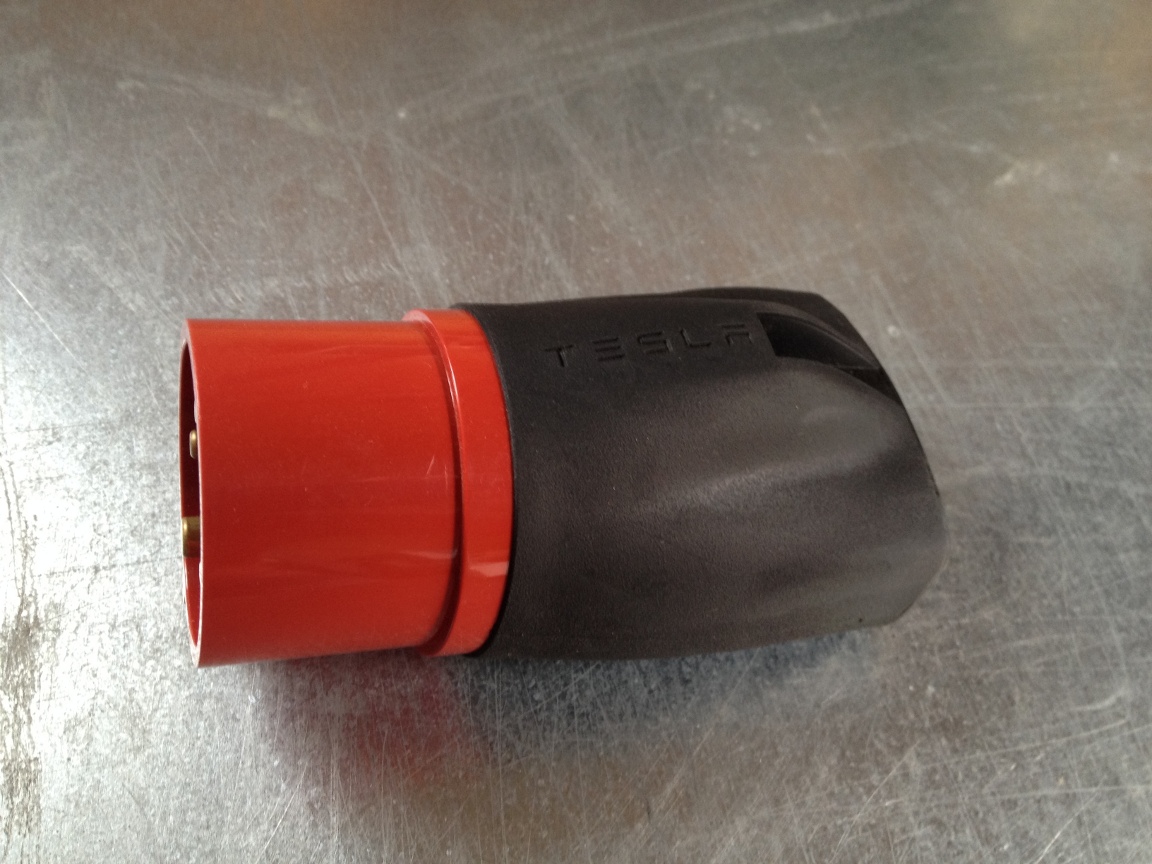
Als deze met de UMC verbonden is ziet het er zo uit:
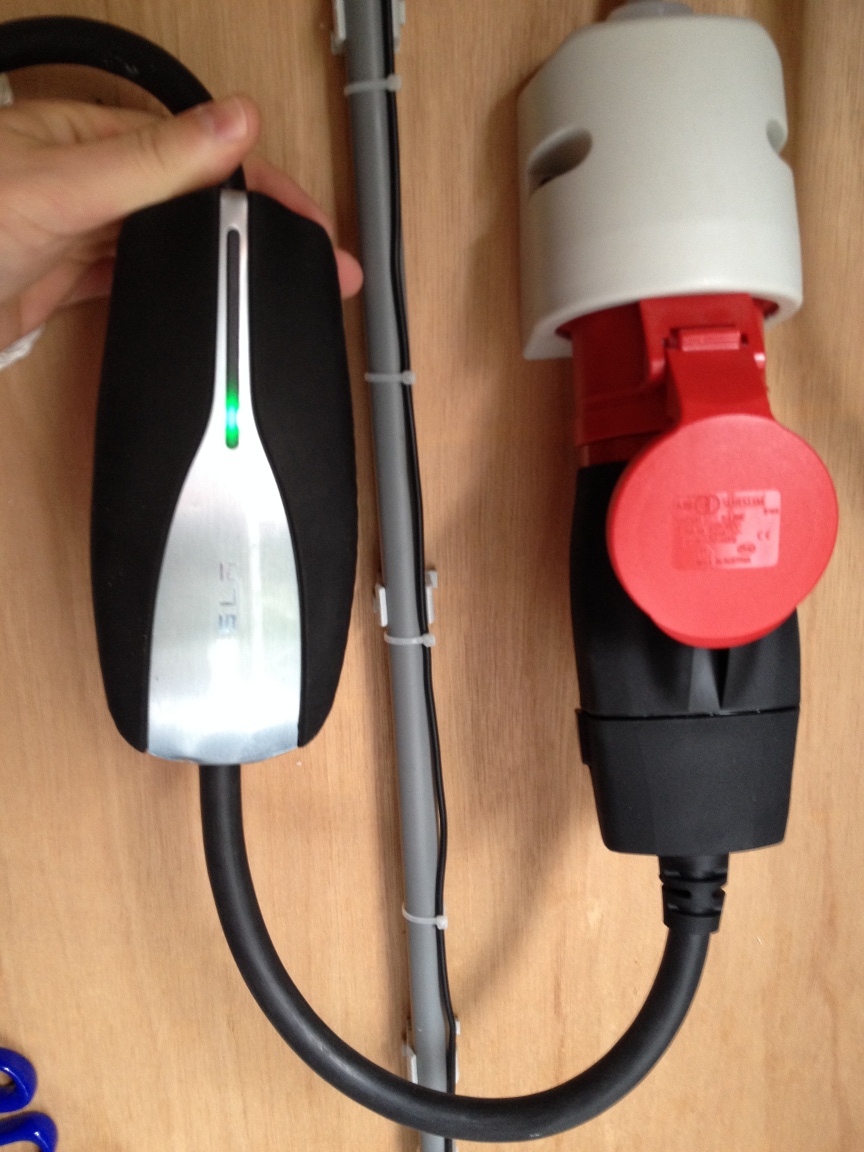
Zo ver ziet het er allemaal prima uit, echter is dit naar mijn mening geen veilige oplossing, hoewel dit op het eerste gezicht wel zo lijkt.
Waarom niet veilig?
Indien de aansluiting goed verbonden is sluit alles netjes aan:
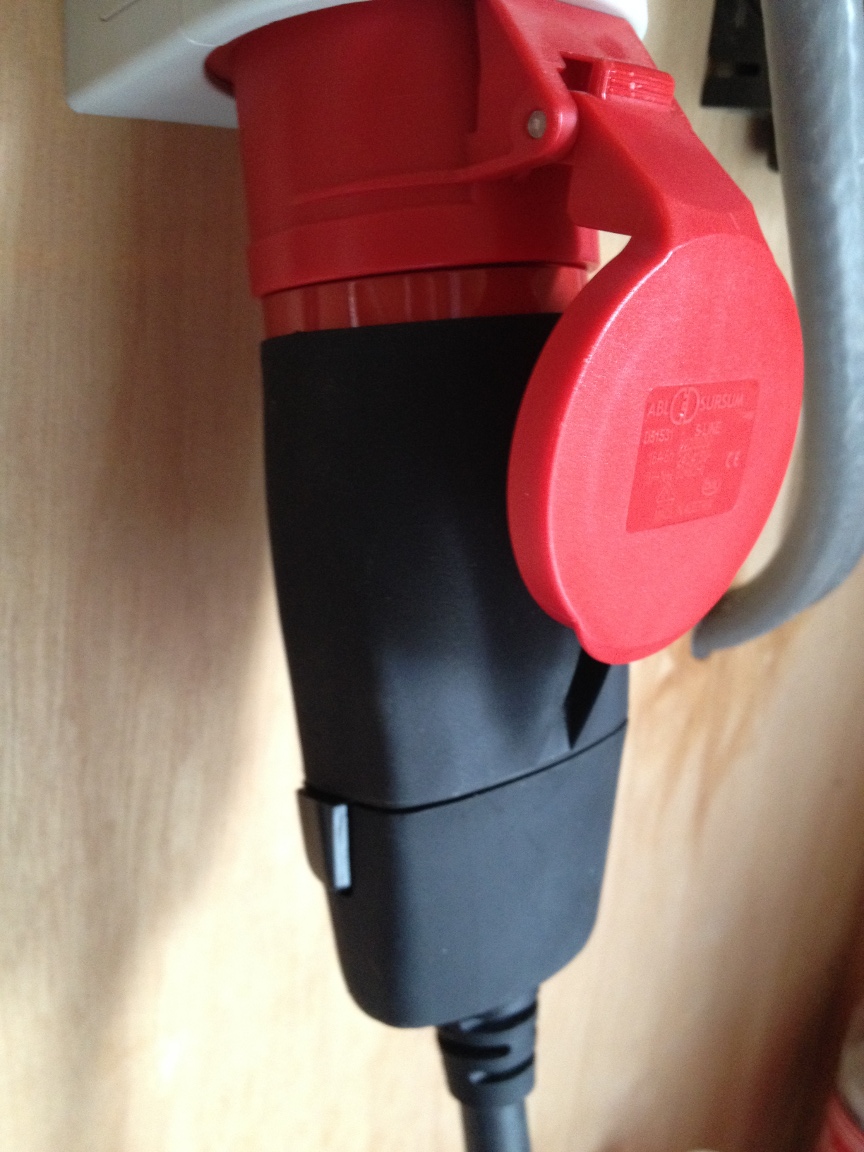
Dat ziet er allemaal prima uit, totdat we een beetje aan de kabel trekken en kijken wat er dan gebeurd:
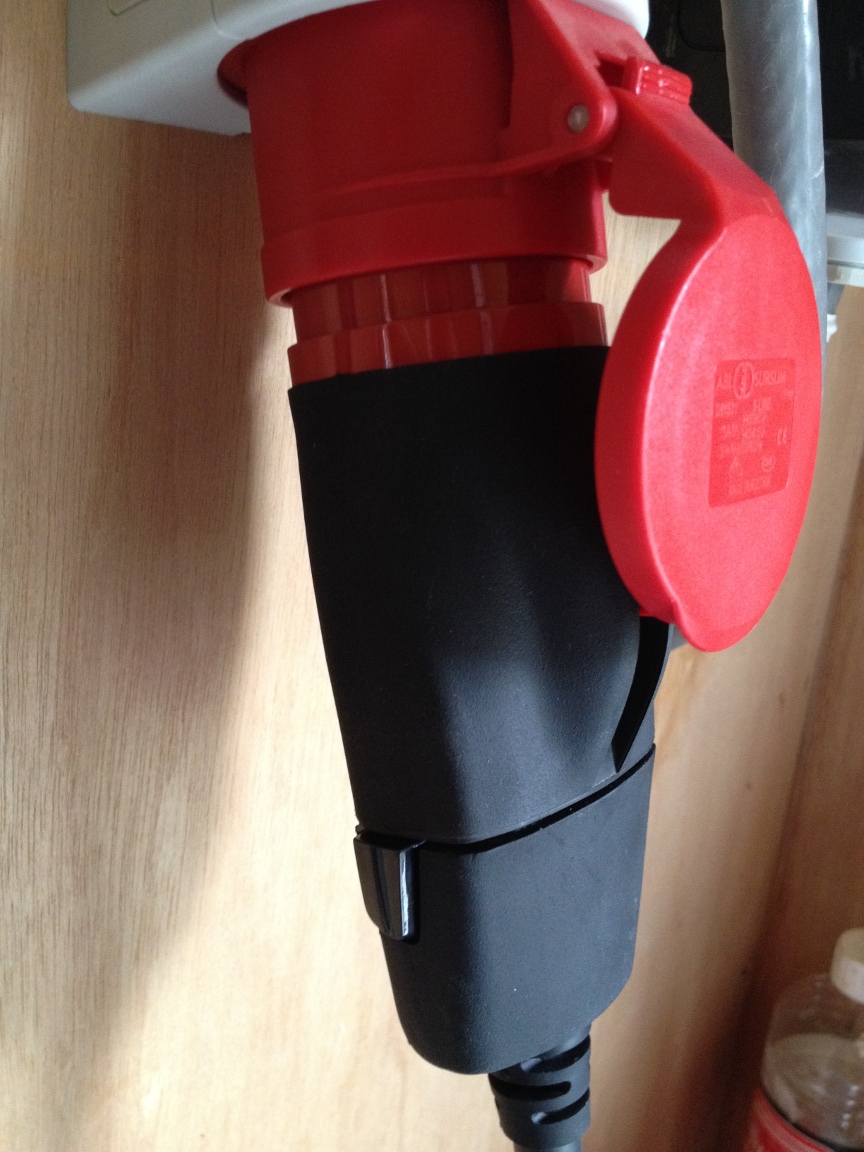
Het ontbreken van vergrendeling
De aansluiting maakt nu nog steeds contact waardoor het laden van de auto nog door zal gaan, echter maken de pinnen in de aansluiting minder goed contact wat kan leiden tot meer warmte ontwikkeling.
Vergeet niet dat er 11kW aan vermogen door deze aansluiting gaat. 11kW staat gelijk aan 11 waterkokers die op vol vermogen aan het verwarmen zijn.
Deze CEE aansluitingen hebben een zeer beperkte vorm van vergrendeling. Het klepje van het aansluiting zou de stekker in de aansluiting moeten houden, maar zoals hier te zien is zit daar nogal wat speling op.
Hoewel deze aansluitingen in de bouw op grote schaal gebruikt worden, worden ze niet onder een continue vollast van 11kW gebruikt voor periodes van 8 uur achter elkaar. Ovens in bakkerijen werken hier ook op, echter gebruiken deze niet voor 8 uur achter elkaar het volle vermogen van de aansluiting en daar zit het probleem.
Het ontbreken van een correcte vergrendeling is hier dus een gevaar wat potentieel tot smelten van de aansluiting kan leiden.
Slijtage van de aansluiting
Dit valt ook samen met de vergrendeling, maar wil ik toch apart noemen.
Niet iedereen die elektrisch gaat rijden is even goed op de hoogte van electra. Het gevaar bestaat dat iemand terwijl de auto aan het laden is de rode stekker uit de aansluiting trekt omdat hij of zij moet gaan rijden. Dit is een moordaanslag op de aansluiting.
We hebben allemaal wel eens de stofzuiger uit het stopcontact getrokkken terwijl deze aan staat. Dit geeft al een flinke vonk in het stopcontact, maar dat is dan nog maar 1 tot 2kW aan vermogen, bij een auto spreken we over 11kW aan vermogen.
Dit zal een goede vonk opleveren binnen in de aansluiting die voor ons niet altijd direct zichtbaar zal zijn. De aansluitpinnen lopen hierdoor echter flinke schade op waardoor hun contactoppervlakte afneemt. De volgende keer dat er geladen wordt met de zelfde aansluiting zal minder oppervlakte zijn om het zelfde vermogen over te dragen wat tot extra warmte ontwikkeling zal leiden door de extra weerstand die in de aansluiting ontstaan is.
Het zal dus niet direct tot een probleem leiden, maar langzaam aan wordt de aansluiting van steeds mindere kwaliteit waarna het op een gegeven moment compleet fout gaat.
Altijd onder spanning
Een rode CEE aansluiting kent geen intelligentie en zal dus altijd onder spanning staan. Dit is een potentieël gevaar voor kinderen. In huis kunnen we kind beveiligingen aanbrengen op alle aansluitingen, maar vervolgens hangt er op de oprit een 3-fase 16A aansluiting die levensgevaarlijk is voor kinderen.
Hoewel de aardlekschakelaar (die ook bij een Rode CEE verplicht is) direct zal ingrijpen is het toch een gevaar als een persoon en met name kinderen een elektrische schok krijgen van deze aansluiting.
Niet bestand tegen de elementen
Hoewel de rode CEE aansluitingen overal hangen ben ik niet van mening van de Tesla UMC met zijn adapters bestand is tegen de elementen.
Hoewel Tesla het niet aan raadt om de UMC buiten te gebruiken ziet het er toch naar uit dat veel Tesla rijders er voor kiezen om de UMC voor hun dagelijkse laden te gaan gebruiken en dus ook buiten in de elementen.
Als je nog eens goed kijkt naar de foto’s zijn er meerdere ‘contactpunten’, namelijk:
- De CEE in zijn Socket
- De CEE Adapter op de UMC
- De Type 2 aansluiting in de auto
De Type 2 aansluiting vertrouw ik nog wel, maar vooral de CEE Adapter op de UMC niet. Deze aansluiting is niet al te sterk en daar kan op termijn corrosie tussen ontstaan wat tot minder contactoppervlak zal leiden.
Zoals eerder in deze post al genoemd, minder contactoppervlakte leid tot een hogere weerstand en daarmee meer warmte ontwikkeling.
Waarom dan een Type 2 laadstation?
De Type 2 aansluiting (ook wel ‘Mennekes’ genoemd) is speciaal ontwikkeld voor het opladen van elektrische auto’s met een vermogen tot 43kW.
Een Model S aangesloten met een Type 2 kabel ziet er als volgt uit:

Hier is te zien dat er slechts twee contactpunten zijn, de kabel in het laadstation (in de muur verwerkt) en de aansluiting in de auto.
Dit is echter niet alles, een laadstation heeft een aantal extra veiligheden ten opzichte van een Rode CEE aansluiting:
- Vergrendeling tijdens het laden. Het is onmogelijk om de kabel uit de auto en/of het laadstation te halen terwijl de auto aan het laden is.
- Een Type 2 kabel heeft 7 pinnen waar een CEE 5 pinnen heeft. Over deze 2 extra pinnen vindt communicatie plaats alvorens het laadstation vermogen levert aan de auto.
- De Type 2 aansluitingen zijn ontwikkeld om in de elementen gebruikt te worden. Zo hebben de aansluiting gaten voor water afvoer indien ze in de regen gebruikt worden.
7 vs 5 pinnen
Een Type 2 aansluiting heeft 7 pinnen waar een CEE 5 pinnen heeft. Allereerst hebben ze het volgende gemeen:
- GND: Een pin voor aarde.
- N: Een pin voor de neutraal.
- L1: Een pin voor fase 1.
- L2: Een pin voor fase 2.
- L3: Een pin voor fase 3.
Tot zo ver zijn de Type 2 aansluiting en de CEE aansluiting het zelfde. Een Type 2 aansluiting heeft echter nog een Control Pilot (CP) en Proximity Pilot (PP) pin.
De CP en PP pinnen worden gebruikt voor communicatie tussen het laadstation en de auto. Via deze pinnen wisselen het laadstation en de auto informatie uit over het beschikbare vermogen en doen een controle van de kabel. Indien aan alle voorwaarden voldaan is schakelt het laadstation een relais in waarna de spanning richting de auto gaat.
Zodra het laden begint zal het laadstation de kabel vergrendelen en aan de zijde van de auto gebeurd het zelfde. Hierdoor is het dus onmogelijk om de kabel uit de auto of het laadstation te halen terwijl er 11 of 22kW (de Model S kan tot 22kW laden bij een Type 2 laadstation) richting de auto gaat.
Een Type 2 connector is echter wel op alle scenario’s ontworpen en dat is goed te zien:
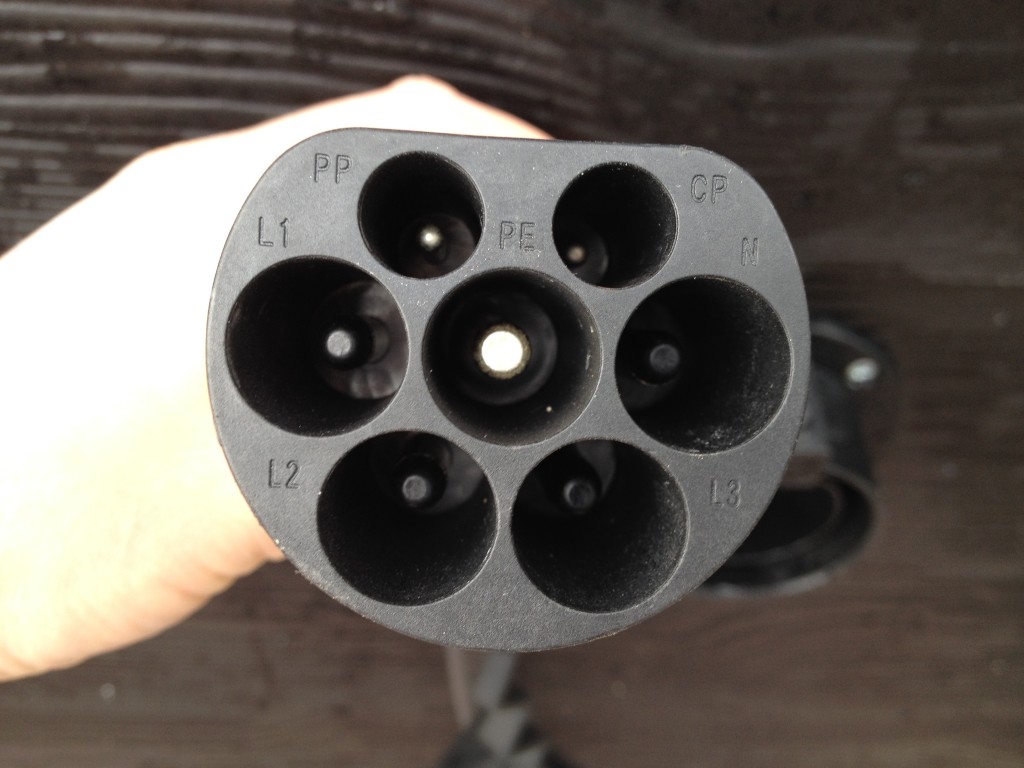
Als je goed kijkt naar de pinnen zie je dat deze qua lengte verschillen, in volgorde van lang naar kort:
- GND
- Neutral
- Proximity Pilot (PP)
- L1, L2 en L3
- Control Pilot (CP)
Het laden kan enkel geschieden wanneer zowel de CP als de PP verbonden zijn.
Mocht het vergrendelen van de kabel door bijvoorbeeld een defect mechanisme falen en de kabel wordt toch uit de aansluiting gehaald tijdens het laden, dan zal als eerste de Control Pilot zijn connectie verliezen. Dit is immers de kortste pin.
Zodra echter de CP niet meer verbonden is zullen de auto en het laadstation per direct het laadproces stoppen. Nog voordat de overige pinnen geen contact meer maken is de gehele aansluiting spanningsloos en zal er dus geen slijtage optreden omdat er simpelweg geen vermogen meer door de aansluiting gaat.
Door deze veiligheden is een Type 2 laadstation dus significant veiliger dan laden via een Rode CEE aansluiting..
Andere motivaties voor een Type 2 laadstation
Niet alleen veiligheid speelt een rol, maar naar mijn mening spelen ook de volgende redenen nog een rol:
- Gemak
- Toekomst bestending
- Mogelijkheid tot Smart Charging
Gemak omdat iedereen hier mee overweg kan. Willen we dat elke ‘idioot’ een elektrische auto kan rijden, dan moet de vraag over welke aansluiting te gebruiken helemaal niet bestaan. De toekomstige EV rijders zullen niet allemaal even begaan zijn met elektriciteit en moeten enkel weten dat ze de Type 2 kabel gewoon in de auto en het laadstation moeten aansluiten waarna de rest vanzelf gebeurd.
Toekomst bestending omdat elke EV bij een Type 2 laadstation kan opladen. Wanneer we overal verschillende aansluitingen hebben moet je rond rijden met een berg aan verloopkabels en adapters, want je weet nooit wat je van te voren tegen gaat komen. Dit argument gaat ook op bij een aansluiting thuis. Over een paar jaar kan je best bezoek krijgen die ook met een EV langs komt. Moeten zij dan van te voren vragen welke verloopstukken ze mee moeten nemen? Als ze weten dat jij een EV thuis hebt zouden ze er toch vanuit mogen gaan dat het gewoon een Type 2 aansluiting is?
En wat als je over 5 jaar een nieuwe EV koopt? Moeten daar dan ook weer allemaal aparte kabels bij om die te kunnen opladen? Het is wel zo handig als deze gewoon in een Type 2 laadstation kan inprikken en kan laden.
Smart Charging is het laatste argument wat een extra motivatie kan zijn. Doordat het laden met een Type 2 laadstation intelligent gaat kan tijdens het laden het vermogen naar beneden en naar boven worden aangepast. Door het laadstation te koppelen met een slimme energie meter kan het laadvermogen worden afgestemd op het actuele verbruik in huis.
Wordt bijvoorbeeld de oven aan gezet dan kan het zijn dat de auto tijdelijk even minder vermogen mag afnemen om zo te voorkomen dat de hoofdzekeringen er uit springen. Iets wat onmogelijk is met dom laden via een CEE aansluiting.
Dit maakt het laden ook nog meer toekomst bestendig omdat zo elke ‘idioot’ overweg kan met een EV. We hoeven niet allemaal verstand te hebben van hoe het werkt. Gemak is ook belangrijk.
Samenvatting
Om dit allemaal nog even samen te vatten in een korte opsomming:
- Laden via een CEE aansluiting is niet veilig door het volledig ontbreken van veiligheids mechanismes.
- Een CEE aansluiting staat altijd onder spanning waar een Type 2 socket pas onder spanning komt te staan zodra een auto verbonden is en alle controles gedaan zijn.
- Het laden via een CEE is niet gemakkelijk doordat er rekening moet worden gehouden met verloopstukjes en adapters.
- Een Type 2 station is toekomst bestendig omdat elke elektrische auto hier probleemloos kan opladen.
- Smart Charging is enkel mogelijk met een Type 2 laadstation en onmogelijk met een CEE aansluiting.
Een 11kW laadstation installeren kost eenmalig tussen de EUR 1000,00 en 2000,00 afhankelijk van het werk wat verricht moet worden, maar daarmee ben je wel volledig toekomst bestendig.
Mijn advies is dan ook om een Type 2 laadstation thuis (of waar dan ook) te installeren en de UMC enkel in noodgevallen te gebruiken waar een Type 2 station niet beschikbaar is.
Ik durf het dan nog beter te stellen: Tesla had bij de Model S nooit een UMC gratis moeten leveren. In plaats van de UMC hadden ze gratis een Type 2 kabel moeten leveren en EUR 500,00 moeten rekenen voor een UMC.
De Tesla UMC en de Rode CEE aansluitingen komt de adoptie van elektrisch rijden niet ten goede.
Welk laadstation te kiezen?
Overtuigd dat een Type 2 laadstation toch beter is? Welke dan te kiezen?
Ik heb mijn laadstation thuis zelf gemaakt, dus ik heb niet al te veel ervaring met de commerciële producten, maar als ik een aanbeveling mag doen, kies dan voor:
Elke fabrikant heeft zijn voor en nadelen waar ik verder geen mening over ga hebben. Zolang er maar wordt gekozen voor een Type 2 station wordt het laden veiliger en gemakkelijker.